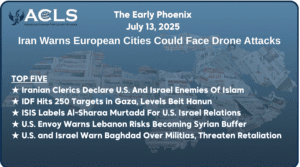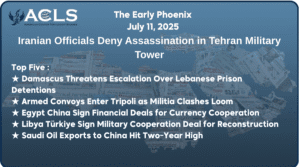The Hamas attack into Israel on October 7 was a shocking reminder of what it means that the Iranian regime has deployed proxy terrorist armies on Israel’s southern and northern borders. But do the Supreme Leader and his Revolutionary Guards have their eyes on Israel’s eastern border with Jordan as well? Circumstantial evidence seems to suggest so. While the world’s attention is drawn to Gaza, Jordan may well be in danger from Iran’s Axis of Resistance.
For four decades, the Iranian regime has aimed to dominate the Levant, embedding itself ever more deeply in Lebanon and Syria and in Palestinian politics. Of all the Levantine states, Jordan is the last nation outside Tehran’s sphere of influence, the final piece of a puzzle that has long eluded the Islamic Republic. But the crisis in Gaza could be changing that, creating unrest that the Iranian regime seems well-positioned to exploit.

Source: U.S. News
By: Rania Kisar and Catherine Perez-Shakdam
November 28, 2023
Playing up Internal Turmoil in Jordan
The Gaza crisis is exacerbating the internal fractures that lie at the heart of the Jordanian state–and that have boiled over before, most notably in the “Black September” crisis of 1970, when Yasser Arafat’s PLO, aided by Hafez al Assad, threatened the survival of the Jordanian monarchy. The Palestinian refugee issue and its associated demographic challenge hangs over everything in Jordan, where over 2 million refugees already grapple with radicalization and social unrest.
Amid the Israel-Hamas conflict, King Abdullah and his government are trying to preserve a delicate balance between their indispensable peace agreement with Israel and the rising discontent of the kingdom’s Palestinian population. Caught between the two, King Abdullah has expressed fears of a new displacement of Palestinians into Jordan that could destabilize his state. The Gaza crisis is also deepening Jordan’s already difficult economic conditions, hurting the tourism sector in particular.
 Source: Politico
Source: Politico
Matters are difficult for Jordan externally as well. The kingdom shares long, indefensible borders with Syria and Iraq, where Iranian proxies operate within easy drone or missile striking distance. It’s no wonder Jordan has requested Patriot air defense systems from the U.S. to protect against such threats or against any spillover from the Gaza conflict. The Iran-backed Axis of Resistance has already been assaulting Jordan’s borders by means of narcotrafficking and arms smuggling.
The Jordanian army has repeatedly had to shoot down drones from Syria linked to the Assad regime and Iran-backed militias that are attempting to flood Jordan with drugs such as Captagon and turn the Hashemite kingdom into a transit point for the criminal drug trade to the Gulf nations. For more than two years, Jordan has been fighting a de facto border war against heavily armed Axis of Resistance smugglers.
But even without resorting to drones, missiles, or narcotrafficking, the Iranian regime could seek to destabilize Jordan by amplifying Iran-aligned political factions, engaging in cyber warfare, and sparking civil unrest via proxies (such as Hamas or Islamic Jihad) that undoubtedly already have a presence among the Palestinian population of the West Bank and Jordan. Such tactics would aim to fracture Jordan’s political unity and create openings for increased Iranian influence through militia proxies.
The Iranian regime and its local allies have worked in the past to make Jordan a transit point for weapons smuggling into the West Bank and Israel, a precedent that seems particularly significant in light of the current Israeli-Palestinian crisis. The period of early 2021 to early 2023 saw a surge in Jordan-based weapons smuggling that coincided with a rise in violence in the West Bank, including one astounding incident in April in which Israeli authorities in April 2023 caught a Jordanian MP smuggling more than 200 guns into the West Bank.
The problem grew severe enough that Mossad accused the Iranians of a deliberate campaign to destabilize the Palestinian territory. Jordan’s former information minister Samih Al-Ma’aita expressed a similar position in a newspaper column on March 14, 2023, when he argued that Jordan could not normalize relations with the Iranian regime as long as Tehran and its proxies continued to pose a threat to Jordan’s security.
Since October 7, the Iran-backed Axis of Resistance has ramped up pressure on Jordan as the Gaza war unfolded. Armed factions linked to Iraq’s Popular Mobilization Forces have been disrupting trade at the Iraqi-Jordanian border for the past two months in protest against Israeli actions in Gaza–a menacing presence given that they are the same militant factions directly attacking U.S. troops in Iraq and Syria.
Meanwhile, Hamas’s Qatar-based leader Khaled Meshal has done his part to raise pressure on the Jordanian state by exhorting Jordanians to attack Israel. On October 10, Meshal called on the “tribes of Jordan, oh sons of Jordan, oh my brothers and sisters in Jordan…the people of Palestine are the ones who, with their steadfastness, protect Jordan. Come to support the people of Palestine, for the borders are close to you.” Meshal’s speech was nothing short of an attempt to reach into Jordan and turn its population against the state, a threat that the hard-pressed King Abdullah and his government must take seriously.
What if Jordan Falls to the Axis of Resistance?
What would it mean for the Iranian regime and its proxies to gain a foothold or freedom of action in Jordan? The consequences would be serious indeed.
First and foremost, Israel would face a strategic quandary with Iranian militant influence inside a state that has been a vital buffer for Israeli security. The Israelis would be forced to reassess their entire military and security posture, extending their forces to an eastern border they have not had to defend in decades.
The implications for the United States would also be severe. Since the 1990s Jordan has been America’s indispensable military platform, without which neither the 2003 Iraq invasion nor the campaign against ISIS could have taken place. Since October 7, the U.S. has deployed significant numbers of additional troops and aircraft to the Middle East to guard against Iranian escalation, and Jordan has been an important host of that deployment.
If the Iranian regime were to succeed in destabilizing Jordan and entrenching its own proxy militias, the U.S. would be in danger of losing a power projection platform it cannot replace. Conversely, for Tehran, gaining a foothold inside Jordan for its militant proxies would create the inescapable perception that its “Axis of Resistance” model is winning out over the American-sponsored model in a contest to determine the regional order for the future.
The emergence of an Iranian-dominated Jordan would have the most profound impact, however, on the Arab states. Gone forever, for example, would be the idea of additional Arab normalization deals with Israel, and even the existing normalization deals would probably not survive. More broadly, Jordan falling into Tehran’s orbit would fracture the Sunni Arab world. Iran’s Axis of Resistance would no longer be just a Shia coalition, but would include Sunni Palestinians, Sunni Jordanians, and Sunni-majority Syria, all fighting at Tehran’s direction against a Saudi-led coalition. This realignment would not just be military.
By gaining a border with Jerusalem, Iran would challenge Saudi Arabia’s religious leadership regarding Islamic holy sites. The Iranian regime’s trumpeting of the Palestinian cause and focus on Jerusalem’s Al Aqsa Mosque are calculated moves to redirect the Islamic world’s religious allegiance towards Tehran, and an Iranian base in Jordan might very well bring that goal within Tehran’s reach.
Conclusion: The Need to Think the Unthinkable

The repercussions of an Iranian regime foothold in Jordan would be so severe for regional and international security that they are difficult even to conceive. A destabilized Jordan alongside a destabilized Syria, a destabilized Iraq, and a destabilized West Bank would constitute a global nightmare worse than the disintegration of the Balkans. But in the aftermath of October 7, with conflict raging or threatening to erupt across the entire region on both land and sea, and Iranian regime ambitions on full display, worst-case scenarios are becoming much too plausible for comfort. The United States, Israel, and the Arab capitals have to confront the fact that all is not safe in Jordan, a country whose affairs have been on shaky ground in the best of times–and these are far, far from the best of times.
==========================
The views and opinions expressed in this article are solely those of the authors and do not necessarily reflect the official policy or position of the American Center for Levant Studies.



